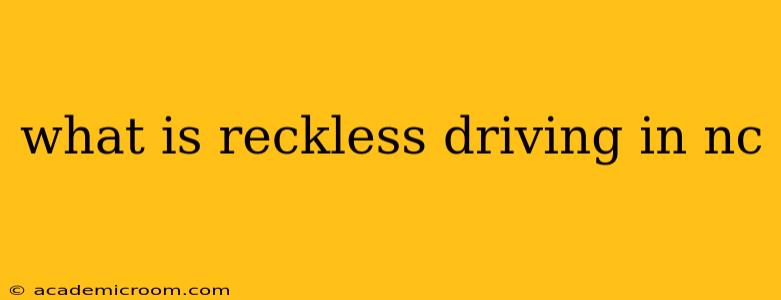Reckless driving in North Carolina is a serious offense carrying significant penalties. It's not simply a matter of speeding; it involves a willful or wanton disregard for the safety of persons or property. This means the driver knowingly acted in a manner that created a substantial risk of injury or damage. Unlike many other traffic violations, reckless driving is a misdemeanor crime, not just an infraction. This distinction significantly impacts the potential consequences.
What Constitutes Reckless Driving in NC?
North Carolina law doesn't offer a specific list of actions that automatically equate to reckless driving. Instead, it focuses on the driver's behavior and the resulting risk. Several actions frequently lead to reckless driving charges, including but not limited to:
-
Excessive Speed: While speeding itself is a separate offense, excessive speeding, especially in dangerous conditions or areas, can easily become reckless driving. The speed doesn't need to be astronomically high; the context matters. Speeding through a school zone or residential area, for instance, is more likely to be considered reckless than speeding on a deserted highway.
-
Aggressive Driving: This includes behaviors like tailgating, weaving in and out of traffic, sudden braking, and making improper lane changes without signaling. These actions, performed individually or in combination, can demonstrate a blatant disregard for other drivers' safety.
-
Driving Under the Influence (DUI): While DUI is a separate charge, driving under the influence of alcohol or drugs often results in a reckless driving charge as well, reflecting the increased risk to others.
-
Racing: Street racing or any form of competitive driving is a clear example of reckless driving. The inherent risk to others and property is undeniable.
-
Ignoring Traffic Signals/Signs: Consistently ignoring traffic laws, such as stop signs or red lights, can lead to a reckless driving charge if the violations create a significant safety hazard.
What are the Penalties for Reckless Driving in NC?
The penalties for reckless driving in North Carolina are substantial and can vary depending on the circumstances of the offense and the driver's prior record. They often include:
- Fines: Significant fines, potentially ranging from hundreds to thousands of dollars.
- Jail Time: While not always mandatory, jail time is a possibility, especially for repeat offenders or cases involving severe risk or injury.
- License Suspension or Revocation: Your driving privileges can be suspended or revoked, impacting your ability to commute, work, or perform everyday tasks.
- Increased Insurance Premiums: Expect a significant increase in your car insurance premiums, potentially for several years.
- Points on Your Driving Record: Reckless driving adds points to your driving record, which can lead to further license suspension or higher insurance rates.
How is Reckless Driving Different from Careless and Reckless Driving?
While the terms sound similar, there's a crucial distinction. In North Carolina, "careless and reckless driving" is a separate, less serious charge than simply "reckless driving." Careless and reckless driving typically involves less severe actions that still show negligence but don't reach the level of a willful or wanton disregard for safety required for a reckless driving charge.
What if I am Charged with Reckless Driving in NC? What Should I Do?
Facing a reckless driving charge requires immediate legal action. Contacting a qualified North Carolina traffic attorney is crucial. An attorney can explain your rights, represent you in court, and work to minimize the potential penalties. The specifics of your case and the evidence presented will greatly influence the outcome.
Can Reckless Driving be Reduced to a Lesser Charge?
In some cases, with a skilled attorney and depending on the evidence and circumstances, it might be possible to negotiate a plea bargain to reduce the charge to something less severe, though this isn't guaranteed.
Remember, this information is for educational purposes only and does not constitute legal advice. Always consult with a legal professional for guidance on your specific situation.
